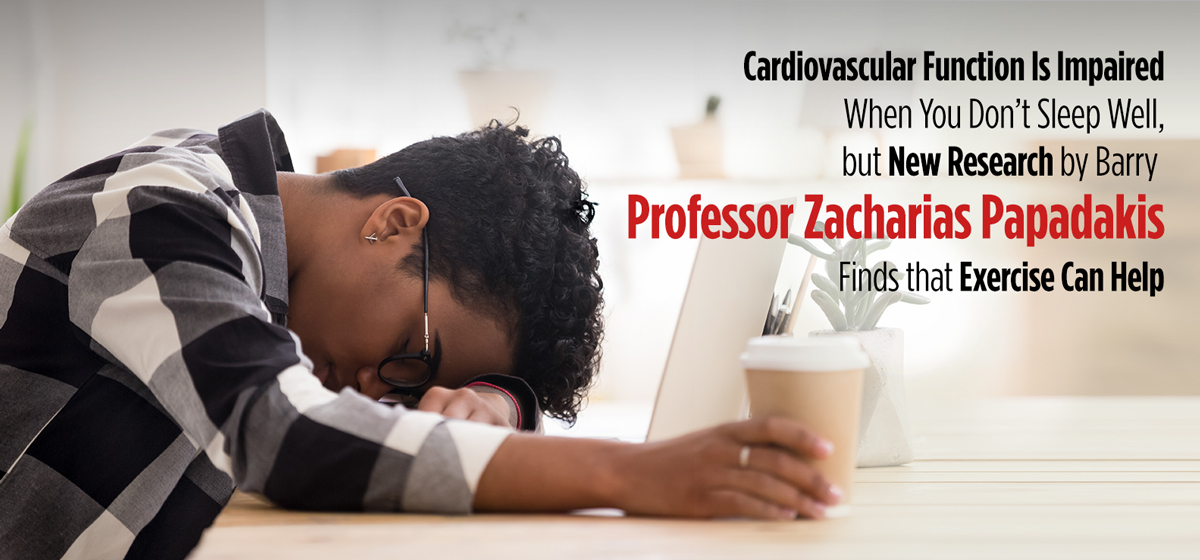When Dr. Zacharias Papadakis decided to study the impact of sleep deprivation and high-intensity interval exercise (HIIE) on cardiovascular health, he was operating from personal experience. The assistant professor in Barry’s Sport & Exercise Sciences department balances his roles as educator and researcher with his passion for fitness, preferring to spend his free time outdoors, running or playing basketball or volleyball. “I exercise a lot,” he says. “As much as my workday schedule allows me.” Occasionally, this dedication to his professional and personal interests can get in the way of a good night’s sleep, as it was nearly three years ago, when Dr. Papadakis conceived of his latest study.
“It was a time that the whole research team was really tired due to research and professional obligations, and we were complaining that we don’t sleep well,” says Dr. Papadakis. “So, after laughing about it, we started wondering what might be the effect of this lifestyle on our lives as researchers, and maybe as individuals, as we all were exercising early in the morning before we went to work. And this is how the whole idea was conceived, setting the foundation for the research design, trying to answer a real-life problem that applies to many people.” The resulting study, published in the Research Quarterly for Exercise and Sport and the European Journal of Applied Physiology , analyzed the influence of acute-partial sleep deprivation (less than 3.5 hours) on the cardiometabolic benefits achieved through HIIE.
Dr. Papadakis designed the study to include 15 healthy, physically active males, between 25 and 55 years of age, who obtained consistent, high-quality sleep. These participants were monitored for cardiovascular function through three experimental conditions. The first provided a baseline scenario in which participants achieved roughly nine hours of sleep followed by a high-fat breakfast. The second condition adhered to the same criteria but included an HIIE session that participants completed prior to eating their high-fat breakfast. The third experimental condition required that participants get no more than three and a half hours of sleep before engaging in their HIIE session and consuming their high-fat breakfast.
Assessing cardiovascular function in scenarios that included a high-fat meal was significant to the study because, as Dr. Papadakis says, “It happens in real life.” His research in applied science always accounts for the ways people live. “Imagine how many people workout early in the morning without receiving an adequate amount of sleep and then how many of those have a heavy, unhealthy breakfast!” he says. “The design had to replicate such a real life’s scenario and also to assess what was the effect of consumed lipids on cardiovascular response during normal sleep, normal sleep and exercise, and short sleep and exercise.”
Most surprising to Dr. Papadakis and his colleagues was the cardioprotective benefits of HIIE as observed in the sleep-deprived participants. Since sleep deprivation has been linked to lesser cardiovascular function, Dr. Papadakis had hypothesized that any benefits achieved through HIIE would be thwarted by lack of sleep. In fact, his results determined that HIIE sessions achieved temporary cardiovascular benefits regardless of short sleep.
Dr. Papadakis is excited that his research is adding to the scientific understanding of the complex relationship between exercise, sleep, and cardiovascular health; but he and his co-authors don’t advise avid exercisers to skimp on sleep. “We suggest following the national sleep recommendations of seven to nine hours,” he says.
As with all his research initiatives, he hopes this study will contribute meaningfully on a practical level. Dr. Papadakis is an advocate for the Exercise Is Medicine (EIM) global initiative managed by the American College of Sports Medicine. At Barry, he teaches EIM-related courses and helps facilitate on-campus activities that highlight the medicinal benefits of physical exercise. As he plans to continue and expand his research, his mission remains constant. “I want people to use my findings to better their lives!” he says.

